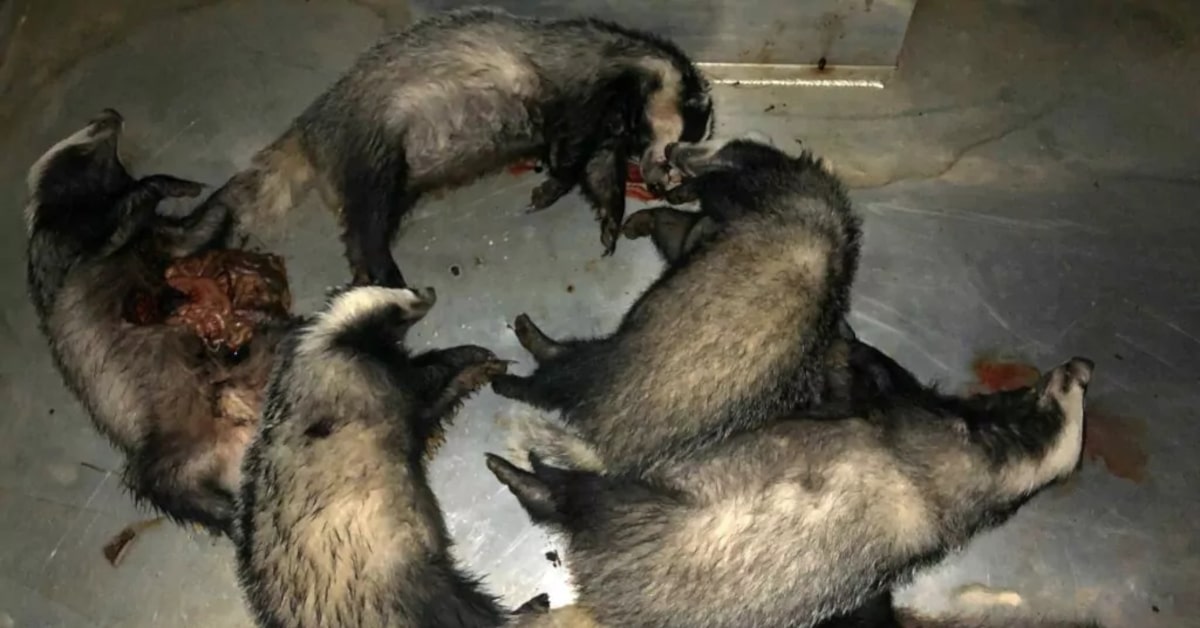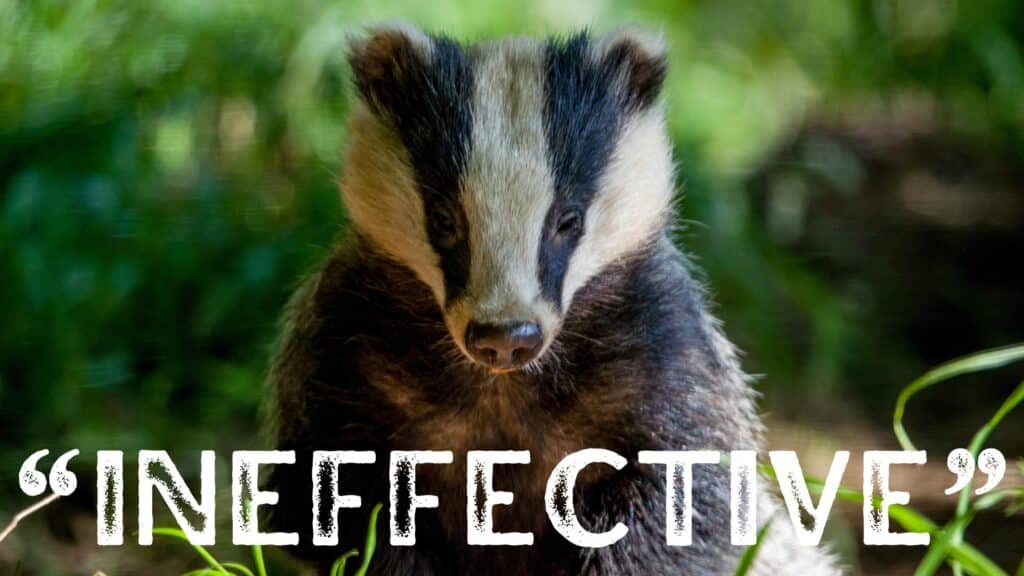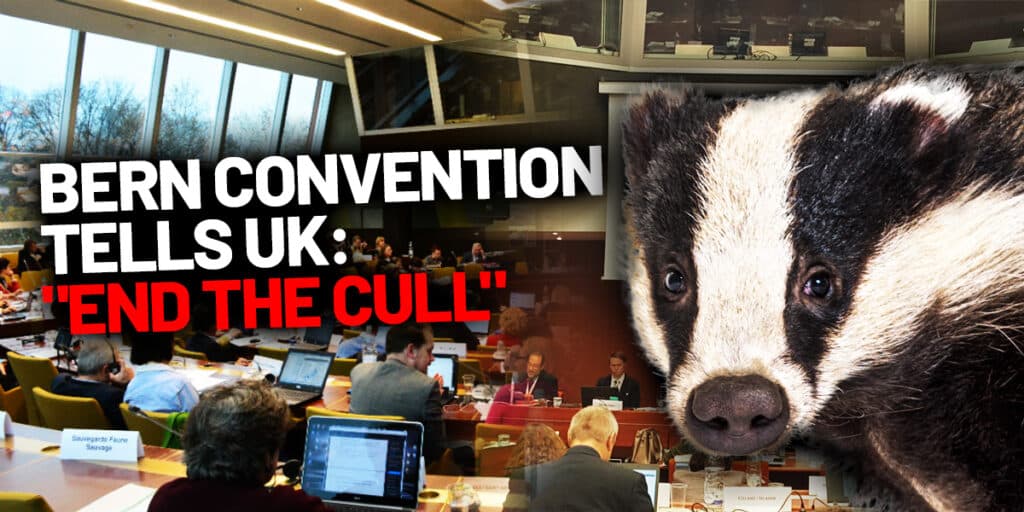An international wildlife treaty body has called on the UK government to swiftly bring its years-long slaughter of the iconic and protected badger to an end.
Following a meeting in June, the Bureau of the Bern Convention issued a decision, which instructed the Department of Environment, Food and Rural Affairs (Defra) to “move with greater urgency and progress on the ending of the badger culling policy.” The Bureau made clear that Defra’s excuses for keeping culling going – possibly up to 2029 – do not wash.
Bern Convention
The Bern Convention came into force in 1982, with an aim to conserve wildlife and natural habitats in the European region. At its core, the convention protects biodiversity through listing wild species of plants and animals in different Appendices and prohibiting exploitation of the groups to varying degrees.
The treaty lists the European badger as an Appendix III species. This means that although some level of exploitation can be permitted, countries must ensure that they do not endanger or ‘seriously disturb’ populations of the species, including on a local level.
Since 2013, successive UK governments have permitted the slaughter of close to a quarter of a million badgers under the cull policy. Such intensive and prolonged killing has implications for the survival of some badger populations, particularly in localised areas. As Protect the Wild reported in June, Northamptonshire Badger Group says the wild animals have “vanished” locally in a cull zone there, including from an ancient woodland surrounded by cull land that badgers have inhabited for generations.
Likewise, several cull areas failed to kill their target number of badgers in 2024, as the Badger Trust has reported. Explaining what this means, the trust warned that the policy “has left badger populations in some areas so low that the shooters cannot find them to kill them.”
Defra’s licensing authority for the cull, Natural England, has monitoring measures in place that are meant to assist the UK in meeting its Bern Convention commitments not to cause the extinctions of badger populations, locally or otherwise. But these measures are heavily reliant on data collected and submitted by cull companies, which does not inspire confidence in their robustness.

Bern calls out the cull
In 2019, as the cull was in its seventh year and had already claimed the lives of more than 67,000 badgers, three organisations – Born Free, the Badger Trust, and Eurogroup for Animals – submitted a complaint to the Bureau of the Bern Convention. They argued that the policy “not only negatively impacts the European badger species, but it fails to effectively tackle the disease of bTB for cattle farmers who are supposed to benefit from it.”
As the cull expanded in the following years, the groups repeatedly filed more reports to back up their case. In their latest submission from January this year, they stressed that prior to the policy’s rollout, Natural England anticipated the cull death toll to be 70,000-100,000 badgers, out of an estimated total population of 190,000 badgers in England.
Ultimately, successive governments have permitted the killing of 2.5-3.5 times more badgers than that. And further massacres are planned, with the existing Labour government ‘honouring’ the cull schedule of its Conservative predecessor, which ends in early 2026. The government has also left the door open for continued culling until 2029, meaning the entirety of its current term in office.
In July, the Bureau of the Bern Convention finally made a move that gave the complainant groups some reason for optimism. After discussing the case at a meeting in June, the Bureau issued a decision on the situation, based on information provided by the complainants and the UK government.
The Bureau essentially told the government that its reasons for continuing the cull are inappropriate and do not stand up to scrutiny.
The government had justified maintaining culling by referencing its limited capacity – including financially – to scale up badger vaccination, according to the decision. The Bureau said it was “concerned that financial reasons are used to justify a derogation from the Convention,” signalling that economic constraints are not an acceptable reason for deviating from the treaty’s rules.
The government had also argued that in the absence of a vaccination rollout, continued culling is necessary to maintain control of bovine tuberculosis in cows, the decision highlighted. The Bureau challenged this, pointing out that scientists, including Natural England’s own director of science, have effectively determined that culling is meaningless and unnecessary.

Bring the cull to a swift end
In concluding, the Bureau said it was “greatly concerned” by the situation and will consider “elevating” the case if things do not improve by a Bern Convention meeting in the summer of 2026. It called on the government to “move with greater urgency and progress on the ending of the badger culling policy as there are clear satisfactory alternatives available.”
Responding to the Bureau’s decision, Born Free’s head of policy, Mark Jones, said:
“The Bern Convention has finally accepted that the UK government’s attempts to justify killing badgers under the Convention’s rules simply don’t wash. One more dead badger is one too many. We implore the government to bring the culling of badgers to an immediate and permanent end, and to initiate meaningful and inclusive dialogue with all stakeholders on alternative strategies for controlling bovine TB among cattle.“
Born Free has since written to the Defra secretary, Steve Reed, calling on him to immediately and permanently end the cull. As yet, Reed has failed to respond.
The Bern Convention is a legally binding treaty. But it is effectively toothless when it comes to enforcement, so this decision does not necessarily mean the government will urgently move to end the cull.
When the Bureau talks of ‘elevation’, it means changing the status of a case in ways that could increase pressure on the government to scrap the policy. Currently, the case is on ‘stand-by’. If it were raised to an ‘open’ file, that would see the case being openly discussed in meetings, which could lead to further condemnation and pressure.

